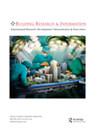COVID-19:振兴混合用途城市中心的催化剂?巴黎的案例
IF 3.7
3区 工程技术
Q1 CONSTRUCTION & BUILDING TECHNOLOGY
引用次数: 1
摘要
摘要自20世纪90年代中期以来,法国公共当局改变了法规,允许将商业建筑改建为住房。新冠肺炎危机影响了全球经济、社会关系、环境轨迹和能源需求/供应。各国一直在考虑采取措施减少疫情的长期影响,自2020年初以来,各国政府建议公司为远程工作提供便利。因此,新冠肺炎导致一些办公楼人口减少。由于技术、环境和经济方面的考虑,预计疫情后将继续在家工作,将空置的办公空间转换为住宅用途的动力越来越大。本研究旨在通过巴黎的案例研究,考虑疫情的影响和在家工作的加速。该研究采用定性和定量相结合的方法,旨在(1)严格分析新冠肺炎疫情后巴黎市政府为加快商业建筑改造而实施的政策工具,以及(2)考虑到以前的政策,评估此类改造的潜力。我们发现,在新冠肺炎危机开始后,已经实施了适应性再利用政策。然而,根据收集到的数据,尽管有变化和经济考虑,但由于对办公空间的持续需求,转换潜力有限。本文章由计算机程序翻译,如有差异,请以英文原文为准。
COVID-19: a catalyst for revitalizing mixed-use urban centers? The case of Paris
ABSTRACT Since the mid-1990s, the French public authorities have changed regulations to allow commercial building conversions into housing. The COVID-19 crisis has affected the global economy, social connections, environmental trajectories and energy demand/supply. Countries have been considering measures to reduce the pandemic’s long-term impact and since the beginning of 2020, national governments have recommended that companies facilitate remote work. Thus, COVID-19 has prompted some office building depopulation. With working from home expected to continue after the pandemic, due to technological, environmental and economic considerations, there is a growing impetus to convert empty office space into residential uses. The present research aims, through the Parisian case study, to consider the impacts of the pandemic and the acceleration of homeworking. Using a mixed qualitative and quantitative methodology, the study aims to (1) critically analyse the policy tools implemented by the Paris municipality following the COVID-19 pandemic to accelerate commercial building conversions and (2) evaluate the potential for such conversions, considering former policies. We found that adaptive reuse policies have been implemented following the beginning of the COVID-19 crisis. However, according to the collected data, conversion potential is limited, due to the continuing demand for office space despite the changes and economic considerations.
求助全文
通过发布文献求助,成功后即可免费获取论文全文。
去求助
来源期刊

Building Research and Information
工程技术-结构与建筑技术
CiteScore
8.60
自引率
7.70%
发文量
43
审稿时长
>12 weeks
期刊介绍:
BUILDING RESEARCH & INFORMATION (BRI) is a leading international refereed journal focussed on buildings and their supporting systems. Unique to BRI is a focus on a holistic, transdisciplinary approach to buildings and the complexity of issues involving the built environment with other systems over the course of their life: planning, briefing, design, construction, occupation and use, property exchange and evaluation, maintenance, alteration and end of life. Published articles provide conceptual and evidence-based approaches which reflect the complexity and linkages between cultural, environmental, economic, social, organisational, quality of life, health, well-being, design and engineering of the built environment.
 求助内容:
求助内容: 应助结果提醒方式:
应助结果提醒方式:


